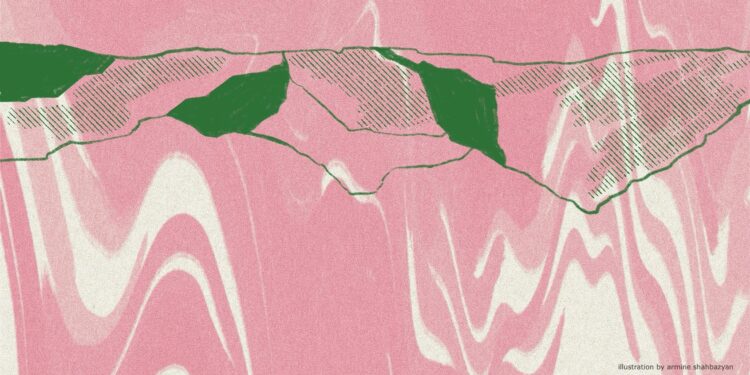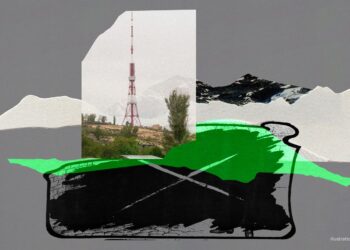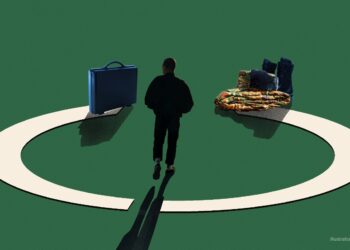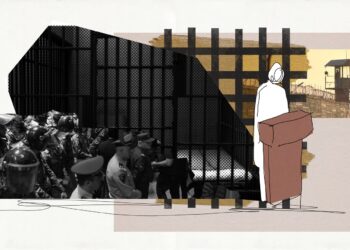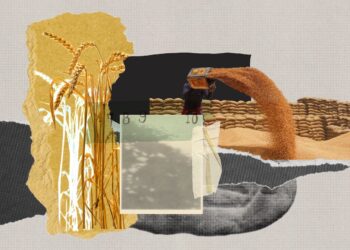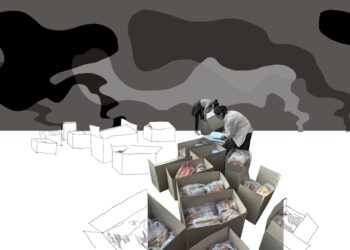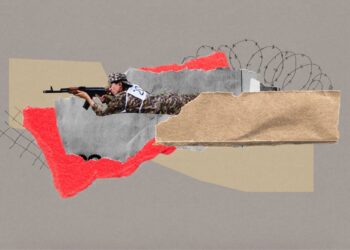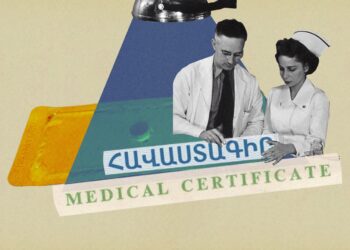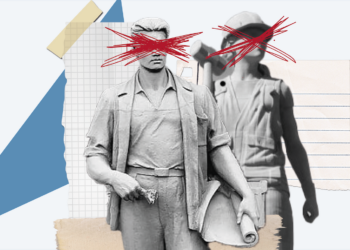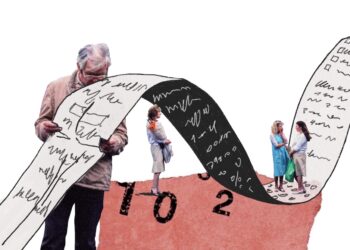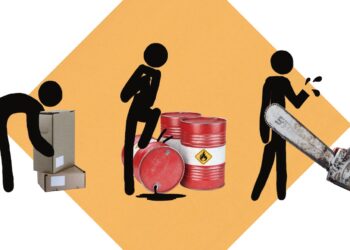Law & Society
No Mercy: The State’s Approach to Punitive Justice
Armenia's justice system is striving to transition from traditional punitive practices to rehabilitation, a shift exemplified by the introduction of the probation service. Lilit Avagyan looks at the issues addressed by this service, its functions, and the beneficiaries it serves.
Toxic Waste Beneath the City: Out of Sight, Out of Mind
Hazardous chemical substances in Armenia have been improperly managed and unsafely stored for decades. Former factories, now abandoned, still hold significant quantities of these hazardous substances. Mariam Tashchyan looks at the challenges of safely managing toxic waste and examines the government's responsibilities.
Enforcement Deficit: Car Seat Laws in Armenia
Although the use of car seats is mandatory in Armenia, it is not being implemented and road police are not addressing the issue. Margarita Ghazaryan addresses the Armenian experience of ensuring the safety of children.
Electronic Justice: Risks and Opportunities
As of February 1, all procedural documentation in new civil cases will be required to be submitted electronically. Astghik Karapetyan discusses the goals, challenges and opportunities presented by the electronic judicial system.
Who Will Opt for Paid Exemption From Military Service?”
Most men who evaded serving in the army left the country before adulthood, often because their parents made the decision for them. A new package of amendments to the law on military service now provides options but how fair are these?
Behind the Wheel: Fatal Car Accidents On the Rise
Armenia has one of the highest rates of automobile deaths among all European Union and former Soviet countries. Despite calls for improving road safety in the country, traffic-related fatalities have increased over the past decade.
In the Pursuit of Justice? The Harmful Prevalence of Pretrial Detention
Although the new Code of Criminal Procedure has been in effect for over a year and new precautionary measures have been introduced, pretrial detention still remains prevalent in Armenia. Astghik Karapetyan examines why courts hesitate to apply other methods.
The Bread Dilemma: Choosing Between Wheat Imports and Domestic Cultivation
Wheat production and import are critical security issues for Armenia. Lilit Avagyan delves into the measures taken to ensure Armenia's food security, focusing on increasing wheat self-sufficiency and maintaining ongoing wheat imports.
Resolving the Unresolved Issue of Garbage
Despite several legislative regulations, adopted strategies and promises, waste management continues to be unresolved in Armenia. Hasmik Baleyan explains.
Nurturing a Culture of Giving Back: The New Law on Voluntary Work
Volunteering has become widespread in Armenia in recent years. However, it has only recently received legal regulation. The critical role of volunteers became especially evident after the Azerbaijani attack on Artsakh on September 19, 2023.
Mission Incomplete: Armenian Police Reforms
The Pashinyan Government's reforms of the police and other institutions promised to bring long-awaited changes to Armenia. While some progress was registered, there have been setbacks and backsliding, particularly after the defeat in the 2020 Artsakh War. Police reform has been no exception.
Assessing Quality or Posing Challenges for Educators?
In 2022, the Armenian government introduced a voluntary teacher certification program. Teachers who pass with high scores receive higher salaries, however, problems persist in the process.
A Fancy Resort, Protesting Villagers and Politics on Mount Aragats
Armenia’s newest ski resort, located on the slopes of Mount Aragats, partially opened last year. While Myler Mountain Resort is expected to become a hub for winter sports enthusiasts, complaints from villagers about the way it is being developed have gone unheeded.
When Untreated Sewage Is Dumped Into Water Resources
Most settlements in Armenia lack proper sewerage systems. Even when such systems exist, the scarcity of sewage treatment plants leads to untreated waste being dumped into water resources.
Human Rights Protection in Residential Institutions
Urgent problems in residential care institutions, including sexual violence, neglect, poor hygienic conditions, and other violations of human rights, require solutions. But is the state taking action to solve these issues? Sona Martirosyan investigates.
The Rise of E-Scooters in Armenia: Creating Solutions or Problems?
E-scooters first appeared in the streets of Yerevan in 2021. With heavy traffic in the city center, they have become an ideal mode of transportation for short-distance commutes, however, not everyone agrees.
Armenia’s Plan for Universal Health Insurance
Access to quality healthcare is a fundamental human right, but remains an unattainable luxury for many in Armenia. As a result, some families find themselves in poverty because of the exorbitant costs of health treatments.
Women in the Military: Voluntary Draft, Mandatory Service
The draft law proposing the inclusion of women in mandatory military service on a voluntary basis is generating much discussion in Armenia. Where and how will women serve? What dangers and problems may arise?
Addressing Sexual Harassment at the Workplace
Amendments to Armenia’s Labor Code regarding the prohibition of sexual harassment in the workplace, vacation time, internships, employment of minors, and other issues will soon come into effect
Electronic Monitoring Bracelets: A New System to Prevent Domestic Violence
The National Assembly has presented a new legislative regulation aimed at preventing domestic violence. Astghik Karapetyan examines to what extent it can achieve its goals.
State Secrets, New Bolts
Authorities have imposed new restrictions and tightened regulations on keeping state information secret. Experts argue that if the current government has made democracy its brand, then it should proceed with caution when imposing such restrictions.
Filling the Knowledge Gap: New Requirements for Residential Building Management
A new government bill sets out to reform the existing system of managing residential apartment buildings in Armenia. Arpine Simonyan explains what the changes imply and how they will be implemented.
Better Late Than Never? Certification Requirement for Medical Workers
Starting on January 1, 2023, healthcare workers in Armenia must receive certification to continue working in the field. Astghik Karapetyan looks at the process and gaps in the system that need to be addressed.
Unregistered Employment, Lost Taxes, Compromised Rights
In the last three years, the number of reported cases of unregistered workers has increased in Armenia. Despite numerous legislative regulations and monitoring tools, unregistered employment remains a critical issue.
Martial Law: A Justification for Imposing Restrictions
A number of restrictions is foreseen in the bill of amendments to the Law “On the Legal Regime of Martial Law.” Arpine Simonyan talks to experts about potential dangers to some fundamental freedoms.
State Support In the Fight Against Infertility
With declining birth rates since the 1990s and the prevalence of infertility in Armenia, the government launched fertility programs. Astghik Karapetyan looks at how effective they have been.
Proposed Changes in Armenia’s Tax System
The Tax Revenue Management Plan for 2022-2025 will encompass several alterations in Armenia’s taxation system. Arpine Simonyan presents the main types of taxes in Armenia, the planned changes and challenges taxpayers face.
Armenian Citizenship: Who Can Obtain It and How
Requirements to obtain citizenship are set out in the Law “On Citizenship of the Republic of Armenia”. There are two main ways through which a person can receive Armenian citizenship –– by birth and by naturalization. Astghik Karapetyan explains the process.
Armenia’s New Gun Law: Risks and Advantages
A new law regulating the acquisition of arms and the sale and circulation of military products was adopted in Armenia. Astghik Karapetyan looks at the risks, dangers and advantages of the law.
Armenia’s New Anti-Corruption Court
Armenia’s new Anti-Corruption Court is now operational and will hear criminal cases on corruption and civil cases of confiscation of illegally obtained assets. Was the creation of a new court necessary and can it have an impact on the fight against corruption?
“Smart” Barns Require “Smart” Calculations
Armenia’s government launched a state assistance program in 2019 for the creation of what they called “smart” barns to improve livestock care and increase milk production. Araks Mamulyan looks at the challenges and shortcomings.
Specialized Personal Assistants for People With Disabilities
Armenia’s government is implementing a legal framework for specialized personal assistants for people with disabilities to ensure their right to live independently and be integrated into their communities. While the initiative is long-awaited, it remains to be seen how it will be realized.
Putting the Brakes on Bookmakers in Armenia
Although betting companies are among the largest taxpayers in Armenia, the state has decided to implement laws restricting ads for online betting and lotteries to mitigate the spread of gambling in the country.
Enlargement of Communities: Problems and Challenges
The large-scale community enlargement program that launched a decade ago in Armenia is ending this year. Hasmik Baleyan looks at the shortcomings and effectiveness of the program.
Medical Sterilization: Voluntary, But Not for Everyone
Draft legislation addressing voluntary medical sterilization was unveiled for public discussion in July 2022. Some of its provisions were deemed highly problematic, particularly by human rights defenders. Astghik Karapetyan explains.
Declaring Income and Assets: Risks and Opportunities
Starting from 2024, the declaration of income and assets will become mandatory for all citizens of Armenia. Araks Mamulyan looks at the advantages and problems of the program.
Grave Insult: Criminalization and Decriminalization
The amendment that criminalized “grave insult” in Armenia was in effect for only ten months. On July 1, 2022, Armenia’s new Criminal Code decriminalized grave insult after public pressure. Araks Mamulyan explains.
Why Are Reforms in Armenia’s Mental Health Sector Being Delayed?
While planned reforms in Armenia’s mental health sector are constantly being delayed, the rights of people continue to be violated. Sona Martirosyan explains.
Dangerous Work: Accidents in the Workplace
Health and security protocols are not always upheld in workplaces in Armenia, often leading to employees getting injured.
All Are Equal Before the Law
To be law-abiding you must know the law, and to protect your rights, you must know the current legal norms. EVN Report launches a new series on Armenia’s current legislative and judicial system.

